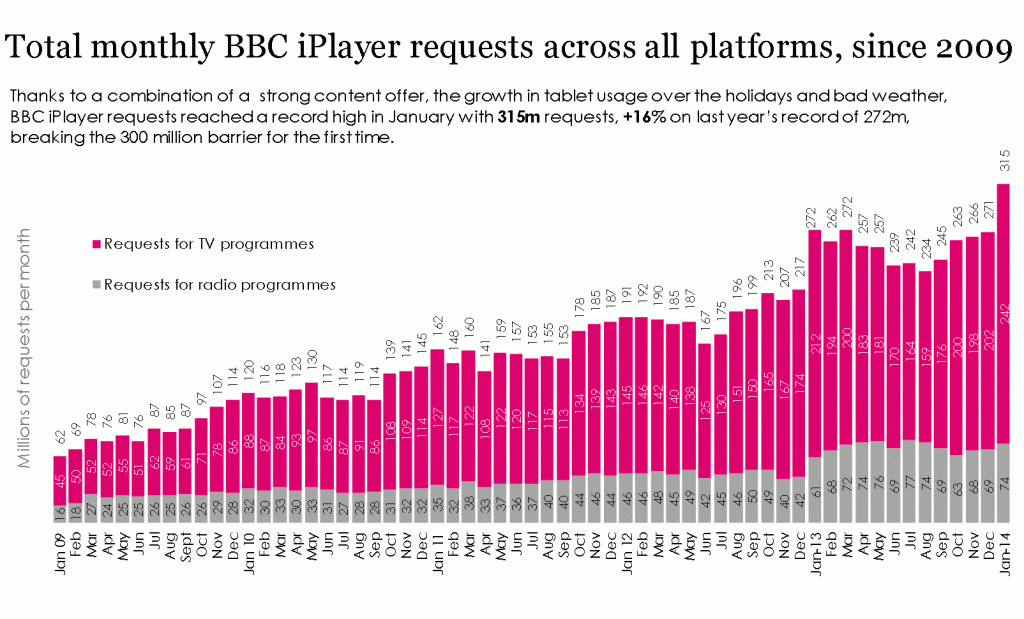I have an unpopular opinion. I think that BBC iPlayer should not be free.
At least, not entirely. And I actually have reasons, and suggestions:
Section 1: Quality of service.
When iPlayer first launched, it was fantastic. Nowadays, it has improved a little, but still lags behind the industry leader (Netflix)
For me, the most noticeable is video and audio quality.
| Platform | Netflix | iPlayer |
| Max Resolution |
1920×1080 | 1280×720 |
| Max Average Bitrate | 6Mb/sec | 2.8Mb/sec |
| Max Audio channels | 6 (5.1) | 2 (2.0) |
The difference isn’t so noticeable on a small laptop, but on a large computer monitor or a television, it’s significant. As for the audio, Netflix use Dolby Ac3 wherever possible, allowing for DVD-quality surround audio. In a decent home cinema system, it makes all the difference, and this is the big jump that the BBC needs to make with iPlayer. It needs to go subscriber-based, but at a high enough quality that people will happily pay for the privilege.
Take this weekend for example. The fantastic new Dr Who episode premiered.
Not having a TV license, the only way that I can legitimately watch is iPlayer. At 720p. Just in stereo. I definitely still enjoyed it, but I would have happily paid for higher quality.
Section 2: Longevity of content.
7 days, and that’s your lot.
My suggestion is to add BBC Archive, too. For a supplemental fee, you get access to everything that has ever been available on iPlayer. This would likely increase storage costs, but for the majority of less viewed content, it would not be ridiculous.
In addition, the basic paid membership and traditional license holders would get a boost to 28 days.
Section 3: Live IP TV without a traditional license.
Lets go back to people like me. We have no license, and do not need or want one. However, once in a while, we might want to watch TV live. Why not make an allowance for that with an additional fee? After all, it is all revenue from people who would otherwise not be paying anything.
Section 4: Pricing Structure:
My proposal is, require a login for iPlayer to access content, and separate the features available by level of membership.
| Features included/Cost |
|
iPlayer Plus (£4) |
Traditional License (£12.12) |
| Number of days catchup | 7 | 28 | 28 |
| BBC Archive | No | £4 | £4 |
| Live (Terrestrial) | No | No | Included |
| Live (IP) | No | £4 | Included |
| SD (576p/2.0) | Included | Included | Included |
| HD (1080p/5.1) | No | Included | Included |
iPlayer free requires registration, but gives free access to 7 days of SD/2.0 material
iPlayer plus adds HD and 5.1 for £4/pm, and increases the time to 28 days.
The Classic License includes the standard terrestrial features, with iPlayer plus included.
iPlayer Archive can be added to Classic or Plus for £4/pm, and live TV streaming to plus for £4/pm.
This would allow someone who has no need of Live TV to get a higher quality of service, with the potential to pay extra for a live license, while also still allowing a free service, and rewarding those who choose to have a terrestrial license.
Section 5: The shift in viewership from Linear (TV) to Non-Linear (Online)
Well, to start that, we need to jump back to 2007/8, when iPlayer was fantastic, new, and not used that much. It was a bonus, and a display of sheer BBC strength; a first for the industry.
Fast-forward a couple of years (Conveniently, when the statistics I could access started, and we have an average of 62 million media requests per month. As there are no figures detailing the duration watched, I am going to assume 20% churn, and an average of 45 minutes watched per non-churn request, This equates to 36 million hours of content viewed.
In the same month, BBC1 and BBC2 alone had 32.5M viewers, watching an average of 32 hrs each. That is 1040M hours, just for the main channels. That’s around people watching online for every 100 TV viewers. At that stage, the consumption is such a small fraction, the free access is not an issue
Now back to 2014. iPlayer consumption stands at 315m views. This bumps our figure up to 182m hours of content watched. TV licenses increased by around 0.6% in that time, so a rough estimation puts hours watched at 1045 million (watching figures are not publicly available) . This increases the people to 17 for each 100 watching TV.
One could even say that maybe half the online viewing hours could be subtracted from the television hours, raising the figure to 19:100.
Unlike terrestrial TV, the more people who watch online content, the more the BBC must pay for bandwidth, so it does have a cost. The other monetary cost worth considering is people who chose not to buy a TV license at all, as they do not watch TV. They never have, and maybe never will. All they need is a fast connection.
Having a reasonable fee would raise revenue from these people, where there would not be otherwise. I feel that a basic free service should still be available, but that a premium service should also be available to those who wish to pay.
BARB Viewing Figures January 2009
TV licences in the UK, 2009-2013
Comments welcome. Encouraged, even.

